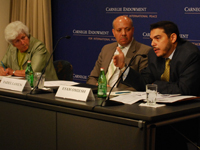Registration
You will receive an email confirming your registration.
IMGXYZ3127IMGZYXMost observers agree it is only a matter of time until Muammar Qaddafi is forced to exit Libya’s political scene. After his departure, Libya will face the daunting challenge of rebuilding its political system from the ground up. Many people both inside and outside Libya have already started thinking about potential transitional mechanisms and which groups will play important roles during the transitional phase.
Esam Omiesh, director of the Libyan Emergency Task Force in Washington, and Fadel Lamen, president of the American Libyan Council, discussed how the transition may unfold from the perspective of the Transitional National Council (TNC) and considered potential roles that the United States and other outside actors can take during the transition. Carnegie’s Marina Ottaway moderated the discussion.
Next Steps
As Libya prepares to move toward a transition, the TNC has already agreed on several important steps that need to be taken, said Omiesh.
- Expand the TNC: Libya should expand the TNC from 33 to 60 members to include newly liberated parts of the country and become more representative of its citizens.
- Form an Interim Government: An interim government to bridge the old regime and a new, more representative government would include technocrats who served in previous governments and capable military and security personnel.
- Appoint a Constitutional Drafting Committee: The committee would consist of fifteen people who have 45 days to draft a constitution, which would then be voted on by national referendum.
- Hold Legislative Elections: Elections for parliament would occur four months after the constitutional referendum.
- Hold Presidential Elections: Elections for the presidency would occur two months after legislative elections.
TNC Chairman Mustafa Abdul Jalil envisions this entire process will take ten to fifteen months, explained Omeish. He also noted that the TNC agreed the new constitution would declare Islam “a” source of legislation rather than “the” source.
The Key Players
According to Lamen, a number of key players will influence the transition:
- The Transitional National Council: The TNC has sought to align any transition with international mandates, meet the legitimate demands of the Libyan people, and preserve freedoms of assembly, religion, and press, stated Lamen. It remains the main player in the transition, and a consensus has formed around both it and the leadership of Abdul Jalil. Yet, as an umbrella group composed of a number of smaller groups with differing agendas, the TNC faces dangers to its viability during the transition, especially its merging of legislative and executive powers which excessively centralizes power. If it does not evolve and become more representative, Lamen warned that it is possible the TNC could be swept aside with the liberation of Tripoli.
- Local Councils: Local councils are running the country on the ground, said Lamen. These councils exist in Benghazi, the cultural capital of Libya, and Misurata, the third largest city, which fought hard to earn its freedom, but also in the smaller towns.
- Coalition of 17th of February: The group of lawyers who make up the Coalition of February 17th helped begin the revolution in Libya, said Lamen. They claim revolutionary legitimacy, yet their consistent challenges to the TNC could undermine the transition process. The Coalition is a closed group, whose members participated in the first uprising, and excludes all others.
- The Islamists: While not a large segment of the population, Islamists in Libya are well organized, explained Lamen. The Muslim Brothers in Libya are more traditional, closer to their Egyptian counterparts than to their more liberal Tunisian brethren. They seek an undefined moderate Islamist state with an active civil society.
- Older Regime Elements: The technocrats of the old regime, the military, the revolution committees, and professional syndicates will all play a role in the transition, asserted Lamen.
Lamen emphasized that while the TNC has high aspirations for the transition, all of the country’s key players must be involved and participate in a dialogue about the country’s future. Such a conversation would be moderated by an outside party, preferably the United States and not an Arab country or the Arab League or Europe, due to the unique role the United States has played in global leadership since World War II.
Implications for the United States
- The Importance of U.S. Leadership: Lamen argued that America must exercise real leadership to help Libya transition into a stable government after the departure of Qaddafi. He emphasized that Qaddafi was talking with the French and trying to take advantage of differences among NATO members. The United States can play an important role in preventing Qaddafi from succeeding in playing NATO members against one another.
- Finishing the Job: Since the beginning of NATO’s operations, the Libyan people have been waving the flags of Western countries that have helped them after Friday prayers, Lamen noted. The fact that an Arab and Muslim country is raising Western flags is an enormous opportunity that should not be squandered, he added. Failure to remove Qaddafi from power may give rise to conspiracy theories in Libya about Western intervention and to anger, which could turn into hate.
Elements Necessary for the Transition
- Domestic Factors: Security, national reconciliation, and economic reconstruction are vital to prevent Libya from becoming more unstable, Lamen said.
- International Role: Lamen mentioned the United Nations or NATO could play a role in the transition. He also suggested that there could be an Arab and Muslim-led international peacekeeping force in Libya, which could involve Turkey.
Ottaway concluded by stating that the timetable for transition in Libya was too fast. She noted two competing and contradictory forces that characterized the transitions in Egypt and Tunisia: the desire to oust the old regime quickly and the need to allow time for the new parties to organize. She highlighted the importance of building consensus and moving into the transition in phases. Finally, Ottaway stressed the danger of having elections prematurely, before a consensus is forged.
